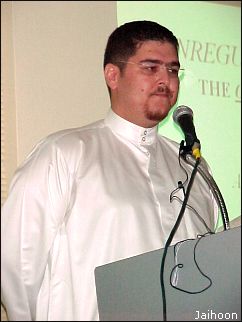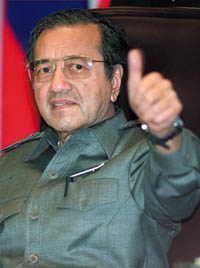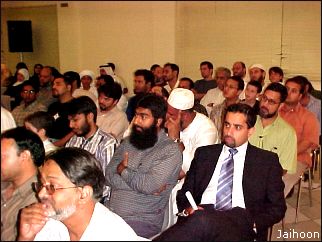
 The small, but attentive assembly, had gathered on time to listen to the ‘Monetary Reformer’. Unlike other functions, there were no much of formalities before or after the speaker.
The small, but attentive assembly, had gathered on time to listen to the ‘Monetary Reformer’. Unlike other functions, there were no much of formalities before or after the speaker.
A brief introduction tot he speaker was given by Monal Zeidan, the PR specialist and prominent media man popular with the English-speaking expat community in UAE. He explained that today’s was financial crisis was a monetary problem, not economic.
David Pidcock fired his interesting speech by contenting that there are many resources in Muslim countries and as such there was no need to roll the red carpet for the IMF- the leech that feeds on the blood of the poor countries.
Muslims had plenty of wealth,
But hardly a pinch of faith.
The speech was based on the ‘The Other Road to Serfdom’, a work based on 60 years of research by Arthur Swan. And the title of the program, ‘The Abuse of Money: From Plato to Nato’ was an encapsulated version of this work.
Arthur in his work noted that the price of something= its intrinsic value.
Referring to the South East economic crisis, Pidcock applauded the skills of Mahathir Mohammed, the Malaysian premier, who ‘was smart enough’ to save his nation from the deceptive games of the currency traders and IMF.
Stepping ahead from ‘micro’ to ‘macro’ level, Pidcock shifted his attention to the issue of taxation. He said that tax arises because of interest. he quoted Abraham Lincoln as saying, ‘Money is a creature of law’ and that he was shot dead 3 days after making such remarks. 
But he breathed fresh enthusiasm among the audience when the monetary policy of Imam Gazzali was discussed. ‘Creation of Dinar and Dirham was a blessing by Allah’ for facilitating easy trade among mankind. However, he had also said that they be treated as a stones having no intrinsic value in itself. ‘Whoever hoards money is like imprisoning a just ruler… Money is created for other things, not itself. Money should not be traded’.
In the course of discussing the fundamentals of money-related issues, he also cited the story  of a man who would go to a bank repeatedly every hour of the same day and ask for the manager. All the times he was told, ‘the manager had passed away yesterday’. Finally when the bank staff got frustrated with the man and demanded an explanation of his disturbing behavior, the man replied, ‘I like hearing that (the death news of the manager)’. The moral of the incident was to show the hatred the common man develops against the banking institution for sucking out all their hard-earned money in the form of interest.
of a man who would go to a bank repeatedly every hour of the same day and ask for the manager. All the times he was told, ‘the manager had passed away yesterday’. Finally when the bank staff got frustrated with the man and demanded an explanation of his disturbing behavior, the man replied, ‘I like hearing that (the death news of the manager)’. The moral of the incident was to show the hatred the common man develops against the banking institution for sucking out all their hard-earned money in the form of interest.
The speaker then narrated a little story called Salvation Island, originally written in 1932 by Louis Even. It is about some group of people who arrive on an Island and settle there carrying out barter form of trade. One day a banker arrives with a barrel of gold. He lends each $200 of printed money. his argument: it’s my gold. So my money. Money is scarce here. Therefore I  charge you 8% interest. Just sign a paper against your property. But I will not take it. just a formality.’
charge you 8% interest. Just sign a paper against your property. But I will not take it. just a formality.’
Everyone was happy. Production increased, but NOT money, on the island.
The banker was happy. He said to himself “They ask money. But I give them chains of bondage. I will instill my philosophy into the minds of bankers, reformers, journalists…”.
Things turned bad.
Money clotted,
And circulated not.
The moral was low. The cost of living increased, because money was lack in supply. Everyone was saving to pay the interest.
An argument broke out between the banker and the people. The people complained that, ‘even if we all pay you the capital amount that was given to us, it will not suffice’. The banker threatened them with action, for they had signed the papers. In addition, he also managed to exert influence on the press to keep people in ignorance.
One of the inhabitants discovered a proposition that money derives its value from what it buys, and NOT gold. And thus the concept of Real Money Unit (RMU). The news spreads in the Island. They foil the evil game of the banker. They force out the banker form the Island. And they start a new form of accounting based on the RMU to keep track of the financial dealings among the people.
And this was similar, the speaker concluded, to the verses of Sura Baqara: 282 of the Holy Quran, which asks the believers to record whatever they spend in the presence of someone. And accordingly, he said jokingly, the world needs a Arthur Anderson free system of accounting.
In the concluding part of the speech, he reminded the audience that credit card is in reality a DEBIT CARD.
And he also spoke about the recently held conference, ‘Is Global Complementary Currency Compatible with Sharia’h’? The conference had answered this question positively. The aim of the conference was to study the possibilities of creating a global currency that was
interest-free
Technically efficient
politically realistic
globally convertible
And value of the new currency, pet-named terra, would be a mix of gold dinar, barrel of oil and other commodities. This would stop the currency traders from money speculation games.
Lights on! The projector was switched off. And the laptop was unplugged. The speech ended. A book was offered for sale, a small portion of which would go for a girl lying in comma at a local hospital.
The speaker had indeed revealed startling facts. And it was to be followed by action, in small and large levels. And it needed the efforts of the man and woman- in the offices and the living rooms- to bring about a change.
If you ask me what was the most interesting part of the speech, I would say that the mention of Austria’s tax policy in 1932. The policy meant a 2.5% penalty on those who did not spend money in the economy from their possession lasting more than a year. My wonder does not stop there… how similar was the Zakat policy adopted by that Unlettered Orphan of Hijaz. It took intellectuals like Keynes and Marx, Smith and Ricardo, Lincoln and Gazzali… to formulate theories on theories and still cause us such economic worries.
But the Economic System of Madina
was founded by a simple man,
Yet the greatest one among the of creations found on earth and heaven,
Handsome than an angel,
who in the words of Quran ‘walked in the markets’
… who helplessly answered Angel Gabriel
‘I do not know how to read’,
when he was commanded to READ!
We have to start READING in the name of the LORD who created us AND the money.
NOte
Summary of a speech given By David M Pidcock at Sharjah on 10/10/2002. Photos by Jaihoon with additional support from Shihaz and Ajeeb.
The Abuse of Money… from Plato to Nato
The Abuse of Money… from Plato to Nato

 The small, but attentive assembly, had gathered on time to listen to the ‘Monetary Reformer’. Unlike other functions, there were no much of formalities before or after the speaker.
The small, but attentive assembly, had gathered on time to listen to the ‘Monetary Reformer’. Unlike other functions, there were no much of formalities before or after the speaker.
A brief introduction tot he speaker was given by Monal Zeidan, the PR specialist and prominent media man popular with the English-speaking expat community in UAE. He explained that today’s was financial crisis was a monetary problem, not economic.
David Pidcock fired his interesting speech by contenting that there are many resources in Muslim countries and as such there was no need to roll the red carpet for the IMF- the leech that feeds on the blood of the poor countries.
Muslims had plenty of wealth,
But hardly a pinch of faith.
The speech was based on the ‘The Other Road to Serfdom’, a work based on 60 years of research by Arthur Swan. And the title of the program, ‘The Abuse of Money: From Plato to Nato’ was an encapsulated version of this work.
Arthur in his work noted that the price of something= its intrinsic value.
Referring to the South East economic crisis, Pidcock applauded the skills of Mahathir Mohammed, the Malaysian premier, who ‘was smart enough’ to save his nation from the deceptive games of the currency traders and IMF.
Stepping ahead from ‘micro’ to ‘macro’ level, Pidcock shifted his attention to the issue of taxation. He said that tax arises because of interest. he quoted Abraham Lincoln as saying, ‘Money is a creature of law’ and that he was shot dead 3 days after making such remarks. 
But he breathed fresh enthusiasm among the audience when the monetary policy of Imam Gazzali was discussed. ‘Creation of Dinar and Dirham was a blessing by Allah’ for facilitating easy trade among mankind. However, he had also said that they be treated as a stones having no intrinsic value in itself. ‘Whoever hoards money is like imprisoning a just ruler… Money is created for other things, not itself. Money should not be traded’.
In the course of discussing the fundamentals of money-related issues, he also cited the story  of a man who would go to a bank repeatedly every hour of the same day and ask for the manager. All the times he was told, ‘the manager had passed away yesterday’. Finally when the bank staff got frustrated with the man and demanded an explanation of his disturbing behavior, the man replied, ‘I like hearing that (the death news of the manager)’. The moral of the incident was to show the hatred the common man develops against the banking institution for sucking out all their hard-earned money in the form of interest.
of a man who would go to a bank repeatedly every hour of the same day and ask for the manager. All the times he was told, ‘the manager had passed away yesterday’. Finally when the bank staff got frustrated with the man and demanded an explanation of his disturbing behavior, the man replied, ‘I like hearing that (the death news of the manager)’. The moral of the incident was to show the hatred the common man develops against the banking institution for sucking out all their hard-earned money in the form of interest.
The speaker then narrated a little story called Salvation Island, originally written in 1932 by Louis Even. It is about some group of people who arrive on an Island and settle there carrying out barter form of trade. One day a banker arrives with a barrel of gold. He lends each $200 of printed money. his argument: it’s my gold. So my money. Money is scarce here. Therefore I  charge you 8% interest. Just sign a paper against your property. But I will not take it. just a formality.’
charge you 8% interest. Just sign a paper against your property. But I will not take it. just a formality.’
Everyone was happy. Production increased, but NOT money, on the island.
The banker was happy. He said to himself “They ask money. But I give them chains of bondage. I will instill my philosophy into the minds of bankers, reformers, journalists…”.
Things turned bad.
Money clotted,
And circulated not.
The moral was low. The cost of living increased, because money was lack in supply. Everyone was saving to pay the interest.
An argument broke out between the banker and the people. The people complained that, ‘even if we all pay you the capital amount that was given to us, it will not suffice’. The banker threatened them with action, for they had signed the papers. In addition, he also managed to exert influence on the press to keep people in ignorance.
One of the inhabitants discovered a proposition that money derives its value from what it buys, and NOT gold. And thus the concept of Real Money Unit (RMU). The news spreads in the Island. They foil the evil game of the banker. They force out the banker form the Island. And they start a new form of accounting based on the RMU to keep track of the financial dealings among the people.
And this was similar, the speaker concluded, to the verses of Sura Baqara: 282 of the Holy Quran, which asks the believers to record whatever they spend in the presence of someone. And accordingly, he said jokingly, the world needs a Arthur Anderson free system of accounting.
In the concluding part of the speech, he reminded the audience that credit card is in reality a DEBIT CARD.
And he also spoke about the recently held conference, ‘Is Global Complementary Currency Compatible with Sharia’h’? The conference had answered this question positively. The aim of the conference was to study the possibilities of creating a global currency that was
interest-free
Technically efficient
politically realistic
globally convertible
And value of the new currency, pet-named terra, would be a mix of gold dinar, barrel of oil and other commodities. This would stop the currency traders from money speculation games.
Lights on! The projector was switched off. And the laptop was unplugged. The speech ended. A book was offered for sale, a small portion of which would go for a girl lying in comma at a local hospital.
The speaker had indeed revealed startling facts. And it was to be followed by action, in small and large levels. And it needed the efforts of the man and woman- in the offices and the living rooms- to bring about a change.
If you ask me what was the most interesting part of the speech, I would say that the mention of Austria’s tax policy in 1932. The policy meant a 2.5% penalty on those who did not spend money in the economy from their possession lasting more than a year. My wonder does not stop there… how similar was the Zakat policy adopted by that Unlettered Orphan of Hijaz. It took intellectuals like Keynes and Marx, Smith and Ricardo, Lincoln and Gazzali… to formulate theories on theories and still cause us such economic worries.
But the Economic System of Madina
was founded by a simple man,
Yet the greatest one among the of creations found on earth and heaven,
Handsome than an angel,
who in the words of Quran ‘walked in the markets’
… who helplessly answered Angel Gabriel
‘I do not know how to read’,
when he was commanded to READ!
We have to start READING in the name of the LORD who created us AND the money.
NOte
Summary of a speech given By David M Pidcock at Sharjah on 10/10/2002. Photos by Jaihoon with additional support from Shihaz and Ajeeb.

